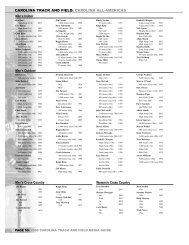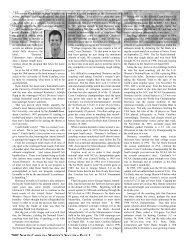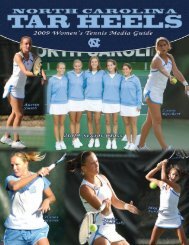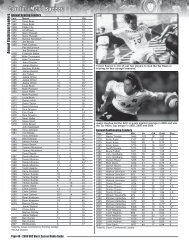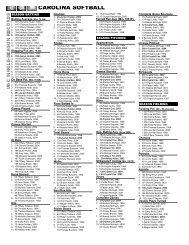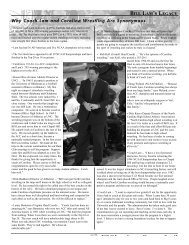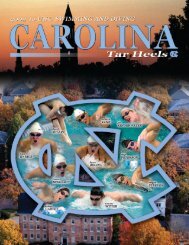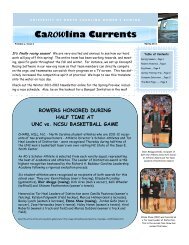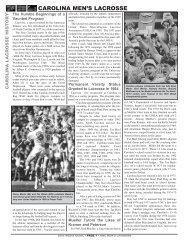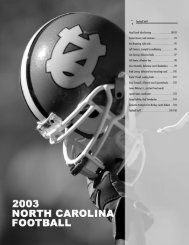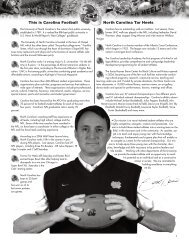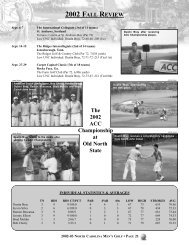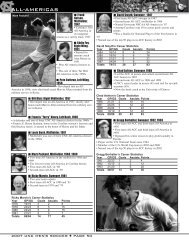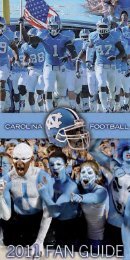2012 Yearbook - University of North Carolina
2012 Yearbook - University of North Carolina
2012 Yearbook - University of North Carolina
You also want an ePaper? Increase the reach of your titles
YUMPU automatically turns print PDFs into web optimized ePapers that Google loves.
A HISTORY OF TAR HEEL SOCCER<br />
The founder <strong>of</strong> the <strong>Carolina</strong> soccer program, Dr. Marvin Allen<br />
(right), with letterwinner Richard Bordogna<br />
The <strong>University</strong> <strong>of</strong> <strong>North</strong> <strong>Carolina</strong> men’s soccer program has written a long and<br />
successful story for itself and enters the 2009 campaign having posted just two<br />
losing seasons in the last 50 years.<br />
With 16 trips to the NCAA tourney - including nine in the last 10 years - the<br />
2001 national championship and three College Cup appearances in hand, the<br />
soccer program at <strong>Carolina</strong> has established itself as one <strong>of</strong> the finest in the<br />
Atlantic Coast Conference and the nation.<br />
Elmar Bolowich became just the fourth head coach in school history in 1989<br />
and has extended the rich history <strong>of</strong> Tar Heel men’s soccer over the past 21<br />
seasons.<br />
Tradition Of Excellence Begins With Allen<br />
Bolowich took over after 12 successful seasons spearheaded by the coaching<br />
<strong>of</strong> Anson Dorrance, a former star player for the Tar Heels, who continues to<br />
direct the <strong>Carolina</strong> women’s program to what is now legendary success each<br />
fall. Dorrance’s men’s teams went 172-65-21 from 1977 through 1988, a winning<br />
percentage <strong>of</strong> .708, the best <strong>of</strong> any coach in <strong>Carolina</strong> men’s soccer history. He<br />
retired from men’s coaching just two victories shy <strong>of</strong> becoming the <strong>University</strong>’s<br />
all-time leader in coaching victories in the sport.<br />
Dorrance’s mentor in the sport, Dr. Marvin Allen, was the guiding force behind<br />
the founding <strong>of</strong> the soccer program at <strong>Carolina</strong> and its head coach for 28 seasons<br />
spanning four decades.<br />
Dr. Allen, who also taught in the physical education department at <strong>Carolina</strong>,<br />
scored the first goal for <strong>Carolina</strong>’s club soccer team when it was founded in<br />
the 1930s. In 1947, the <strong>University</strong> elevated the sport <strong>of</strong> men’s soccer to varsity<br />
status and Allen, in a most natural decision, was named the team’s first head<br />
coach. It was a decision by Athletic Director Bob Fetzer that bore fruit for years<br />
to come.<br />
Allen coached the Tar Heels for 28 seasons in the period from 1947 until<br />
his retirement after the 1976 season. Allen missed the 1951 and 1952 seasons<br />
when he was on active duty with the United States Armed Forces in the Korean<br />
War and the team was coached on an interim basis during those two years by<br />
Alan Moore.<br />
In 28 campaigns, Allen’s teams combined for a record <strong>of</strong> 174-81-23, a winning<br />
percentage <strong>of</strong> .667. Allen’s 1948 team won the Southern Conference title,<br />
the first <strong>of</strong> four league crowns won by UNC in its soccer history. Beginning in<br />
1953, <strong>Carolina</strong> teams started competing in the Atlantic Coast Conference and<br />
compiled a record <strong>of</strong> 54-41-16 under Allen’s leadership.<br />
In 1966, <strong>Carolina</strong> won the first <strong>of</strong> its three ACC men’s soccer championships,<br />
sharing the championship with Maryland as both teams posted 3-1 records.<br />
Two years later, in 1968, <strong>North</strong> <strong>Carolina</strong> earned the first <strong>of</strong> its 14 bids to the<br />
NCAA Tournament, losing its first-round match to Michigan State 5-0 in Chapel<br />
Hill. The Spartans went on that year to share the NCAA championship with<br />
Maryland.<br />
Dorrance Takes Over<br />
Prior to Allen’s last season at the helm <strong>of</strong> the Tar Heel program in 1976,<br />
Dorrance was designated head men’s soccer coach at the <strong>University</strong>, assisting<br />
Allen during his last year before taking over the head duties in 1977. It was a<br />
wise choice by Tar Heel Athletic Director Bill Cobey.<br />
Under the direction <strong>of</strong> both Dorrance and Bolowich, the Tar Heels have<br />
established themselves as a force to be heard from in the ACC and on the<br />
national soccer scene. In addition, competing in the ACC, the nation’s toughest<br />
top-to-bottom collegiate soccer league, has helped give the Tar Heel program<br />
a high visibility.<br />
Dorrance had some outstanding teams in his early years at <strong>Carolina</strong>. His<br />
1977, 1978 and 1979 teams all finished second in the ACC while posting overall<br />
records <strong>of</strong> 14-3-1, 12-3-4 and 16-3-5, respectively. The 1981 team finished<br />
15-6 overall and scored a shocking 1-0 overtime upset victory over Clemson<br />
in Chapel Hill, the first win for <strong>Carolina</strong> over the Tigers in 12 years. Freshman<br />
Kenny West scored an overtime goal for <strong>Carolina</strong> that day at Fetzer Field which<br />
gave UNC its first win over I.M. Ibrahim’s powerhouse team since 1969.<br />
In 1983, the Tar Heels finished the season with a brilliant 16-3-2 record<br />
but were snubbed by the NCAA selection committee when it passed out postseason<br />
bids. That slight even occurred after <strong>Carolina</strong> upset No. 1-ranked and<br />
Page 34<br />
<strong>2012</strong> NORTH CAROLINA MEN’S SOCCER<br />
2001 & 2011 NATIONAL CHAMPIONS<br />
undefeated Duke 2-1 in overtime in the final match <strong>of</strong> the regular season before<br />
a large crowd at Fetzer Field. Mark Devey scored an unassisted overtime goal<br />
to give the Tar Heels the win over the Blue Devils.<br />
The breakthrough year for the Tar Heels under Dorrance proved to be 1987.<br />
Led by All-America defender David Smyth, the Tar Heels stunned the ACC by<br />
winning only their second conference title in history. The Tar Heels accomplished<br />
that feat by winning the championship <strong>of</strong> the inaugural ACC Men’s<br />
Soccer Tournament, which was played that year before capacity crowds at Duke<br />
<strong>University</strong>. UNC used that tournament championship as a springboard to future<br />
success and advanced all the way to the NCAA Final Four, while recording 20<br />
victories during the season.<br />
<strong>Carolina</strong> had finished fourth that year in the ACC regular-season standings<br />
with a 3-3 record, but the Heels defeated fifth-seeded Clemson, 2-1, in overtime<br />
and top-seeded Virginia, 3-0, in the first two rounds <strong>of</strong> the ACC Tournament.<br />
<strong>Carolina</strong> then came back from a 3-1 second-half deficit to knock <strong>of</strong>f NC State,<br />
4-3, in the finals <strong>of</strong> the tournament. Smyth scored the tying goal for UNC with<br />
4:37 left in regulation and then tournament most valuable player Derek Missimo,<br />
a freshman, scored the winning goal in overtime.<br />
Advancing to NCAA Tournament play for only the second time in school history,<br />
the 1987 team had to win three consecutive games on the road to advance<br />
to the Final Four, blanking Duke, 2-0, edging South <strong>Carolina</strong>, 2-1, on sudden<br />
death penalty kicks and beating Loyola (Md.), 1-0, on yet another Missimo goal.<br />
The Final Four was awarded to Clemson by the NCAA committee. The Tigers<br />
defeated <strong>Carolina</strong>, 4-1, in the semifinals and then went on to beat San Diego<br />
State for the national championship.<br />
<strong>Carolina</strong> suffered massive graduation losses <strong>of</strong>f that 1987 team and, despite<br />
a preseason No. 1 ranking, started the following season in a sluggish manner.<br />
After 11 matches, <strong>Carolina</strong> found itself with a disappointing 4-6-1 ledger.<br />
But the Tar Heels ran <strong>of</strong>f a seven-match winning streak to put themselves in<br />
contention for an NCAA Tournament bid. For the second straight year, UNC<br />
played well in the ACC Tournament, upsetting host Clemson 2-1 in the first<br />
round. That marked <strong>Carolina</strong>’s first victory at Clemson since 1968. UNC then<br />
avenged a controversial regular-season loss at Duke by beating the Blue Devils<br />
2-1 in the semifinals, a loss which knocked Duke out <strong>of</strong> the NCAA Tournament.<br />
In the finals, the Tar Heels jumped out on top <strong>of</strong> top-seeded Virginia in the first<br />
half, but the Cavaliers rallied for a 2-1 victory to deny UNC a second straight<br />
conference crown.<br />
The Heels did earn an NCAA invitation, however, as the No. 2 seed in the<br />
South Region. <strong>Carolina</strong> traveled to Wake Forest in the first round and beat the<br />
Demon Deacons, 2-0, before losing at top-seeded South <strong>Carolina</strong>, 3-1, in the<br />
South Region finals at Columbia, S.C.<br />
Bolowich Takes The Reins<br />
Dorrance resigned as men’s coach after the 1988 season to concentrate on<br />
his duties with the <strong>Carolina</strong> women’s team, and Bolowich has taken the Tar<br />
Heels to new heights since taking over as head coach in ‘89. The 2001 national<br />
title marked the summit <strong>of</strong> that climb to national prominence, and his 2008 club<br />
reached the national title game.<br />
After missing the NCAA Tournament in Bolowich’s first year as head coach,<br />
the Tar Heels returned to tournament play in 1990 and 1991. Surviving a midseason<br />
slump in 1990, <strong>Carolina</strong> claimed a tournament bid on the strength <strong>of</strong><br />
regular season victories over third-ranked South <strong>Carolina</strong>, eighth-ranked Wake<br />
Forest and 10th-ranked ACC champion and NCAA Final Four participant NC<br />
State. The Heels downed Wake Forest, 2-1, in the first round <strong>of</strong> the NCAA<br />
Tournament under the lights at Fetzer Field before losing at perennial nemesis<br />
Virginia, 3-1, in the second round.<br />
<strong>Carolina</strong>, with a mark <strong>of</strong> 15-6-1, found itself in postseason play once again in<br />
1991. The Tar Heels played host to UNC Charlotte in the first round and beat<br />
the 49ers 1-0 in overtime as sophomore forward Todd Haskins scored in the<br />
99th minute <strong>of</strong> play. The second-ranked Billikens <strong>of</strong> St. Louis eliminated the Tar<br />
Heels in the round <strong>of</strong> 16 with a resounding 4-0 victory at St. Louis.<br />
After a disappointing 1992 campaign, <strong>Carolina</strong> returned to the limelight in<br />
1993, ranking as high as 12th in the final Soccer News poll. Led by freshman<br />
sensation Temoc Suarez, the ACC Rookie <strong>of</strong> the Year, and All-America<br />
defender Gregg Berhalter, UNC finished 13-7-2 and advanced to the Round <strong>of</strong><br />
16 <strong>of</strong> the NCAA Tournament for the fourth time in six years.<br />
Berhalter was especially amazing in an NCAA first round victory over Duke<br />
as he scored twice and assisted on another in UNC’s 3-2 victory over the Blue<br />
Devils at Fetzer Field.<br />
The 1994 campaign proved to be another success as <strong>Carolina</strong> finished 13-7<br />
and made the NCAA Tournament for the sixth time in eight seasons. Led by<br />
All-Americas Eddie Pope and Temoc Suarez, as well as ACC Rookie <strong>of</strong> the Year<br />
Carey Talley, <strong>Carolina</strong>’s season was highlighted by a 5-1 victory over national<br />
champion Virginia, only UNC’s second win over the Cavaliers since 1980.<br />
Injuries crippled the UNC team in 1995 but the Tar Heels still managed an<br />
11-8-1 record. Among other injured players, preseason first-team All-America<br />
defender Eddie Pope was limited to just nine games. Nevertheless, <strong>Carolina</strong><br />
played one <strong>of</strong> the toughest schedules in the nation, including eight games<br />
against top-15 foes, and reached the semifinals <strong>of</strong> the ACC Tournament. Junior<br />
Temoc Suarez led the Tar Heels in scoring and was named second-team All-<br />
ACC. Pope was named to the first-team despite his limited action and sophomore<br />
Carey Talley was a second-team all-conference choice.<br />
The Tar Heels went 8-8-1 in 1996. Along the way, Carey Talley was named<br />
first-team All-ACC and third-team All-America after leading the Tar Heels with<br />
nine goals. Temoc Suarez led UNC in scoring for the fourth year in a row and<br />
was named second-team All-ACC.<br />
Saddled with a young team and a lack <strong>of</strong> depth due to injury problems,<br />
<strong>Carolina</strong> was 6-13 in 1997, its first losing season in 40 years. Senior Carey<br />
Talley, one <strong>of</strong> 15 finalists for the Missouri Athletic Club Collegiate Player <strong>of</strong> the<br />
Year award, was named first-team All-ACC and third-team All-America for the<br />
second straight year.



